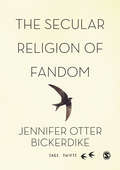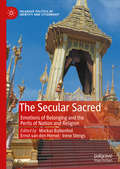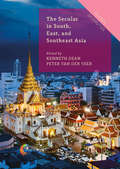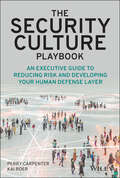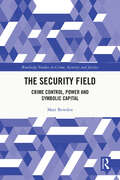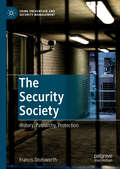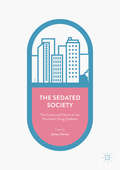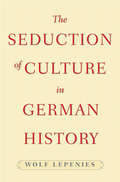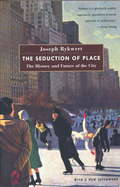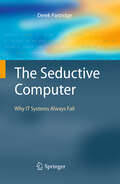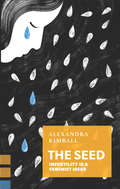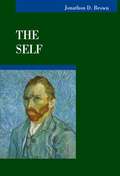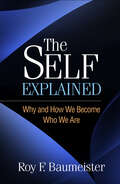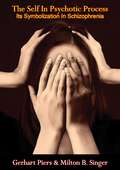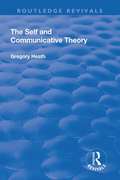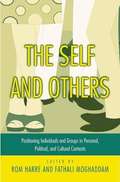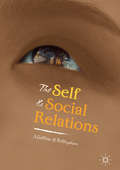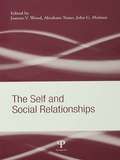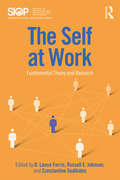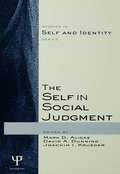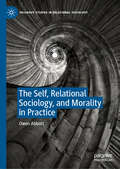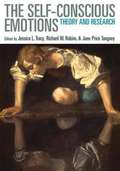- Table View
- List View
The Secular Religion of Fandom: Pop Culture Pilgrim (SAGE Swifts)
by Dr Jennifer Otter BickerdikeMedia pilgrimage has become a booming business in the 21st century. Fans of television shows, rock groups and books flock to places associated with their favorite series, artist or writer, trying to embody and perhaps understand what inspired the beloved piece of work, and, more importantly, to cobble together their own personal identity, seeking meaning in an ever-more divergent and fast-paced world. At the same time, participation in organized group activities are dropping. One of the largest down turns in the US and the UK can be seen in the steep decline of attendance at traditional religious venues. This trend dovetails with the radical uptick in on-line sites dedicated to pop culture and celebrities, as well as an array of niche-focused real-time tours allowing fans to experience the spaces, places and scenery featured in their favorite entertainment medium. The Secular Religion of Fandom: Pop Culture Pilgrim examines the function of fandom, specifically the visiting of spaces which have been recently deemed worthy of sanctification and a newly elevated status of importance. It examines how such pilgrimages are used as a means for forming and maintaining a common language of culture, creating a replacement apparatus based on more traditional frameworks of religious worship and salvation, while becoming an ever more dominant mechanism for constructing individuality and finding belonging in a commodified culture. Looking at television shows such as The Walking Dead and Game of Thrones, bands like The Stone Roses and Joy Division, and authors like J.K. Rowling and the Brontë sisters, The Secular Religion of Fandom: Pop Culture Pilgrim delves into these issues by examining spaces, fan communities and rituals, providing a unique and provocative investigation into how technology, media and humanistic need for guidance are forming novel ways of expressing value, forging self and finding significance in an uncertain world.
The Secular Religion of Fandom: Pop Culture Pilgrim (SAGE Swifts)
by Jennifer Otter BickerdikeMedia pilgrimage has become a booming business in the 21st century. Fans of television shows, rock groups and books flock to places associated with their favorite series, artist or writer, trying to embody and perhaps understand what inspired the beloved piece of work, and, more importantly, to cobble together their own personal identity, seeking meaning in an ever-more divergent and fast-paced world. At the same time, participation in organized group activities are dropping. One of the largest down turns in the US and the UK can be seen in the steep decline of attendance at traditional religious venues. This trend dovetails with the radical uptick in on-line sites dedicated to pop culture and celebrities, as well as an array of niche-focused real-time tours allowing fans to experience the spaces, places and scenery featured in their favorite entertainment medium. The Secular Religion of Fandom: Pop Culture Pilgrim examines the function of fandom, specifically the visiting of spaces which have been recently deemed worthy of sanctification and a newly elevated status of importance. It examines how such pilgrimages are used as a means for forming and maintaining a common language of culture, creating a replacement apparatus based on more traditional frameworks of religious worship and salvation, while becoming an ever more dominant mechanism for constructing individuality and finding belonging in a commodified culture. Looking at television shows such as The Walking Dead and Game of Thrones, bands like The Stone Roses and Joy Division, and authors like J.K. Rowling and the Brontë sisters, The Secular Religion of Fandom: Pop Culture Pilgrim delves into these issues by examining spaces, fan communities and rituals, providing a unique and provocative investigation into how technology, media and humanistic need for guidance are forming novel ways of expressing value, forging self and finding significance in an uncertain world.
The Secular Sacred: Emotions of Belonging and the Perils of Nation and Religion (Palgrave Politics of Identity and Citizenship Series)
by Ernst van den Hemel Irene Stengs Markus BalkenholHow do religious emotions and national sentiment become entangled across the world? In exploring this theme, The Secular Sacred focuses on diverse topics such as the dynamic roles of Carnival in Brazil, the public contestation of ritual in Northern Nigeria, and the culturalization of secular tolerance in the Netherlands. The contributions focus on the ways in which sacrality and secularity mutually inform, enforce, and spill over into each other. The case studies offer a bottom-up, practice-oriented approach in which the authors are wary to use categories of religion and secular as neutral descriptive terms. The Secular Sacred will be of interest to sociologists, anthropologists, ethnographers, political scientists, and social psychologists, as well as students and scholars of cultural studies and semiotics. Chapter 1 is available open access under a Creative Commons Attribution 4.0 International License via link.springer.com.
The Secular in South, East, and Southeast Asia (Global Diversities)
by Peter van der Veer Kenneth DeanThis innovative edited collection provides a comprehensive analysis of modern secularism across Asia which contests and expands prevailing accounts that have predominantly focused on the West. Its authors highlight that terms like ‘secular’, ‘secularization’, and ‘secularism’ do not carry the same meanings in the very different historical and cultural contexts of Asia. Critiquing Charles Taylor’s account of secularism, this book examines what travelled and what not in ‘the imperial encounter’ between Western secular modernity and other traditions outside of the West. Throughout the book, state responses to religion at different points in Chinese and South-East Asian history are carefully considered, providing a nuanced and in-depth understanding of post-secular strategies and relations in these areas. Particular attention is given to Catholicism in the Philippines, Vietnam, and Singapore, and Hinduism and Chinese religion in Malaysia, Singapore, and India. This theoretically engaged work will appeal to students and scholars of Asian studies, anthropology, religious studies, history, sociology, and political science.
The Security Culture Playbook: An Executive Guide To Reducing Risk and Developing Your Human Defense Layer
by Perry Carpenter Kai RoerMitigate human risk and bake security into your organization&’s culture from top to bottom with insights from leading experts in security awareness, behavior, and culture. The topic of security culture is mysterious and confusing to most leaders. But it doesn&’t have to be. In The Security Culture Playbook, Perry Carpenter and Kai Roer, two veteran cybersecurity strategists deliver experience-driven, actionable insights into how to transform your organization&’s security culture and reduce human risk at every level. This book exposes the gaps between how organizations have traditionally approached human risk and it provides security and business executives with the necessary information and tools needed to understand, measure, and improve facets of security culture across the organization. The book offers: An expose of what security culture really is and how it can be measured A careful exploration of the 7 dimensions that comprise security culture Practical tools for managing your security culture program, such as the Security Culture Framework and the Security Culture Maturity Model Insights into building support within the executive team and Board of Directors for your culture management programAlso including several revealing interviews from security culture thought leaders in a variety of industries, The Security Culture Playbook is an essential resource for cybersecurity professionals, risk and compliance managers, executives, board members, and other business leaders seeking to proactively manage and reduce risk.
The Security Field: Crime Control, Power and Symbolic Capital (Routledge Studies in Crime, Security and Justice)
by Matt BowdenHow crime and security are governed has become a critical issue in criminology over the first quarter of the twenty-first century. Today, we see a broader landscape of regulatory players who are involved in the control and management of crime, whether in crime prevention, safety in the community or in providing private security services. The Security Field: Crime Control, Power and Symbolic Capital gets to grips with these changes and argues that this forms an emerging field in which different players appear to compete and co-operate but are ultimately vying to shape and order the field. This book draws on new thinking in the social sciences on questions of crime, fear and security and contributes to the expanding interest on the sociology and criminology of security by offering a Bourdieusian approach to plural policing and the everyday political economy of security.Drawing from Bourdieu’s concept of field, this book builds a theory of the security field based upon a series of in-depth interviews with security actors such as senior police officers, NGOs, private security professionals, government officials and community safety workers in Ireland. It demonstrates how security producers compete for cultural capital in its many forms – as data, information and relationships – and ultimately as a way of cementing their positions in this emerging field. It shows the dominant power of the formal police and central government in shaping and ordering this relational space. In doing so, The Security Field: Crime Control, Power and Symbolic Capital builds an empirical case from three distinct areas of security production: urban security, community safety and the connections between regulated private security and public crime prevention. It explores the challenges of securitisation in respect of public safety, security and rights and the way in which social problems such as drug use, homelessness and urban marginality are recast as ‘security’ concerns.An accessible and compelling read, this book will appeal to students and scholars of criminology, sociology, urban studies and security studies.
The Security Society: History, Patriarchy, Protection (Crime Prevention and Security Management)
by Francis DodsworthThis book provides a critical engagement with the idea of the ‘security society’ which has been the focus of so much attention in criminology and the social sciences more broadly. ‘Security’ has been argued to constitute a new mode of social ordering, displacing the ‘disciplinary society’ that Foucault saw as characteristic of the liberal era. He saw a ‘control society’ (or ‘risk society’) characteristic of Neo-Liberalism, in which the deviant behaviour of particular individuals, as less important than general attempts to offset risk and reduce harm. Dodsworth argues that much of this literature is extraordinarily present-ist in orientation, denying the long history of attempts to mitigate risk, prevent harm and manage security which have always been a part of the government of order. This book develops a ‘critical history’ of security: a thematic analysis of debates about security and aspects of the security society which puts contemporary arguments and practices in dialogue with the texts and practices of the past. In doing so the book develops a cultural analysis of the meanings of security and the way these meanings have been articulated in particular practical contexts in order to understand how the promise of security has so effectively captured the imagination and channeled the effective engagement of people throughout the modern period.
The Sedated Society
by James DaviesThis edited volume provides an answer to a rising public health concern: what drives the over prescription of psychiatric medication epidemic? Over 15% of the UK public takes a psychiatric medication on any given day, and the numbers are only set to increase. Placing this figure alongside the emerging clinical and scientific data revealing their poor outcomes and the harms these medications often cause, their commercial success cannot be explained by their therapeutic efficacy. Chapters from an interdisciplinary team of global experts in critical psychopharmacology rigorously examine how pharmaceutical sponsorship and marketing, diagnostic inflation, the manipulation and burying of negative clinical trials, lax medication regulation, and neoliberal public health policies have all been implicated in ever-rising psycho-pharmaceutical consumption. This volume will ignite a long-overdue public debate. It will be of interest to professionals in the field of mental health and researchers ranging from sociology of health, to medical anthropology and the political economy of health.
The Seduction of Culture in German History
by Wolf LepeniesDuring the Allied bombing of Germany, Hitler was more distressed by the loss of cultural treasures than by the leveling of homes. Remarkably, his propagandists broadcast this fact, convinced that it would reveal not his callousness but his sensitivity: the destruction had failed to crush his artist's spirit. It is impossible to begin to make sense of this thinking without understanding what Wolf Lepenies calls The Seduction of Culture in German History. This fascinating and unusual book tells the story of an arguably catastrophic German habit--that of valuing cultural achievement above all else and envisioning it as a noble substitute for politics. Lepenies examines how this tendency has affected German history from the late eighteenth century to today. He argues that the German preference for art over politics is essential to understanding the peculiar nature of Nazism, including its aesthetic appeal to many Germans (and others) and the fact that Hitler and many in his circle were failed artists and intellectuals who seem to have practiced their politics as a substitute form of art. In a series of historical, intellectual, literary, and artistic vignettes told in an essayistic style full of compelling aphorisms, this wide-ranging book pays special attention to Goethe and Thomas Mann, and also contains brilliant discussions of such diverse figures as Novalis, Walt Whitman, Leo Strauss, and Allan Bloom. The Seduction of Culture in German History is concerned not only with Germany, but with how the German obsession with culture, sense of cultural superiority, and scorn of politics have affected its relations with other countries, France and the United States in particular.
The Seduction of Place
by Joseph RykwertNo other place on earth is as full both of promise and of dread as the city; it is at once alienating and exciting. These concentrations of people have not, however, come about as the result of vast immutable, impersonal forces, but because of human choices. The worsening or betterment of urban life will also be the result of choices. Our choices. That cities display and represent the personal desires of their inhabitants is central to Joseph Rykwert's argument in The Seduction of Place. Insisting that they are the physical constructs of communities, he travels through history to trace their roots in ancient times and outlines current attempts and future possibilities to improve the metropolis. Rykwert includes a broad range of urban landscapes: 18th-and 19th-century Paris and London, the current sprawl of Mexico City and Cairo, planned cities like Brasilia, and, finally, New York, the world capital.Always opinionated and often controversial, Rykwert assesses how and why urban projects from the past succeeded or failed and what lessons can be drawn from them for the future. Ultimately, The Seduction of Place is a deeply felt and powerfully reasoned call for a commitment by every citizen to the creation of a more humane place to live.
The Seduction of Place: The History and Future of the City
by Joseph RykwertOne of the most highly respected architectural historians of our time takes on the question of whether or not we have the cities we need and what we can do to create them.
The Seductive Computer
by Derek PartridgeIT systems explode budget estimates, bust production deadlines by years, and then fail to work properly. Why this IT-system crisis? Poor programmers? Inadequate project management? No. The Seductive Computer argues that the fundamental nature of programming technology itself is the real culprit; it promises perfection but can only deliver emergent chaos. It is also an insidiously compelling technology, peculiarly male oriented. IT systems, an unavoidable and increasing reality in all our lives, are something new to man - large-scale discrete complexity. The Seductive Computer explains this novelty that defies human understanding. This book illustrates in a simple yet thorough manner the underlying concepts necessary for understanding the IT-system crisis - not 'How To Program' but what the demands of programming are. It then proceeds to lay out the full gamut of issues - all stemming from the nature of the technology. From development to maintenance IT-system personnel are grappling with incipient chaos. The technicians are seduced by the detailed challenge of the technology. The scientists are seduced by the promises of their technology. The managers and users are seduced by the mysteries of the technology. No IT system is ever fully understood by anyone, so surprising behaviours will always emerge. What can be done? We must rein in our expectations of IT systems: what they can do, and how reliably they can do it. On the positive side, The Seductive Computer discusses novel paradigms that look beyond the current discrete technology: neural computing and precise approximation computing.
The Seed: Infertility Is a Feminist Issue (Exploded Views Ser.)
by Alexandra KimballIn pop culture as much as in policy advocacy, the feminist movement has historically left infertile women out in the cold. This book traverses the chilly landscape of miscarriage, and the particular grief that accompanies the longing to make a family. Framed by her own desire for a child, journalist Alexandra Kimball brilliantly reveals the pain and loneliness of infertility, especially as a lifelong feminist. Her experience of online infertility support groups -- where women gather in forums to discuss IVF, surrogacy, and isolation -- leaves her longing for a real life community of women working to break down the stigma of infertility. <P><P>In the tradition of Eula Biss’s On Immunity and Barbara Ehrenreich's Bright-sided, Kimball marries perceptive analysis with deep reportage -- her findings show the lie behind the prevailing, and at times paradoxical, cultural attitudes regarding women’s right to actively choose to have children. Braiding together feminist history, memoir, and reporting from the front lines of the battle for reproductive rights and technology, The Seed plants in readers the desire for a world where no woman is made to feel that her biology is her destiny.
The Seeley Lectures: The Politics of the Human
by Anne PhillipsThe human is a central reference point for human rights. But who or what is that human? And given its long history of exclusiveness, when so many of those now recognised as human were denied the name, how much confidence can we attach to the term? This book works towards a sense of the human that does without substantive accounts of 'humanity' while also avoiding their opposite – the contentless versions that deny important differences such as race, gender and sexuality. Drawing inspiration from Hannah Arendt's anti-foundationalism, Phillips rejects the idea of 'humanness' as grounded in essential characteristics we can be shown to share. She stresses instead the human as claim and commitment, as enactment and politics of equality. In doing so, she engages with a range of contemporary debates on human dignity, humanism, and post-humanism, and argues that none of these is necessary to a strong politics of the human.
The Self
by Jonathon BrownAlthough social psychology has been traditionally focused on interpersonal relationships, the cognitive revolution in psychology has had the effect of refocusing some social psychology on intra-psychic processes. This area of psychology has become very popular in recent years, yet there is currently no other textbook available for the study of the self. Republished in its original form by Psychology Press in 2007, this book carefully documents the changing conceptions and the value accorded the self in psychology over time. It further outlines the many alternative conceptions of this increasingly central domain in social psychology. New research and conceptions are juxtaposed with the classic and traditional, providing the reader with a comprehensive introduction to the study of the self.
The Self Explained: Why and How We Become Who We Are
by Roy F. BaumeisterThe idea of the self is immediately familiar to everyone, yet elusive to define and understand. From pioneering researcher Roy F. Baumeister, this volume synthesizes a vast body of knowledge to provide a panoramic view of the human self--how it develops and functions, why it exists, and what problems it encounters on the journey through life. What are the benefits of self-knowledge, and how attainable is it? Do we have one self, or many? What is the relationship of self and society? In 28 concise chapters, Baumeister explains complex concepts with clarity and insight. He reveals the central role played by the self in enabling both individuals and cultures to thrive.
The Self In Psychotic Process: Its Symbolization In Schizophrenia
by C. G. Jung John Weir PerryC.G. Jung started as a psychiatric learning from schizophrenic patients. Among the Jungian school, only John Weir Perry has continued this line of Jung's work with such depth of understanding, clinical acumen, and the ability to write beautifully. Perry's therapy in the California Bay Area with acute episodes in young psychotic patients brought him national and international renown. The case of the young housewife diagnosed catatonic schizophrenic demonstrates the interpenetration of collective symbols and individual processes as they come to light in 'breakdown' (Part One), and extends knowledge of the psyche by elucidating symbols of the Self (Part Two).-Print ed.
The Self and Communicative Theory
by Gregory HeathThis title was first published in 2000: This text contributes to the development of communicative theory by advancing a theory of the self-sufficient to support intersubjectivity and meet the conditions required for communicative rationality and communicative reason. The conclusion supports theories advanced by Habermas, Apel and Wittgenstein, evaluated against the background of later works from Immanuel Kant. The origins of communicative theory in the writings of Kant and Charles Sanders Peirce are sketched, followed by an outline of the development of the theory by Apel and Habermas. In this discussion a central issues is identified as the failure of communicative theory to produce an adequate theory of the self as the subject of communicative transactions. It is argued that both Mead and Habermas fail to fully establish intersubjectivity as they retain elements of a Cartesian introspective subjectivity. An alternative approach, developed by Charles Taylor, is then discussed. Finally, it is argued that freedom and imagination, understood in the context of Kant and the late Wittgenstein are the key elements to a self capable of supporting the intersubjectivity required by communicative theory.
The Self and Others: Positioning Individuals and Groups in Personal, Political, and Cultural Contexts
by Rom Harre; Fathali Moghaddam<p>This volume focuses on relations between the self and other individuals, the self and groups, and the self and context. Leading scholars in the field of positioning theory present the newest developments from this field on human social relations. The discussion is international, multidisciplinary, and multi-method, aiming to achieve a more dynamic and powerful account of human social relations, and to break disciplinary boundaries. <p>Four features in this work are prominent. The book is culturally oriented and international. There is a push to move across disciplines, particularly across psychology and linguistics, and psychology and microsociology. There is a focus on language and social construction of the world through discourse. Finally, the book represents a multi-method approach that reflects discursive methods.<p>
The Self and Social Relations
by Matthew WhittinghamThis book is concerned with the human individual and her relationship with the communities of which she is a member. It argues against the traditional atomistic view that individuals are essentially independent of the social relations into which they enter, and instead argues for the holistic view that we are essentially social beings who cannot exist apart from normative communities. Matthew Whittingham engages in a sustained exploration and criticism of the classic Western picture of epistemology. He argues instead that communities ground the possibility of our forming a conception of the world and ourselves, that those social relations open up a range of affective responses and forms of action that would otherwise be impossible, they enable us to know and reason about the world, and they make possible the daily struggles for freedom and self-realization that are familiar to us all and find their most powerful expression in major social movements.
The Self and Social Relationships
by John G. Holmes Abraham Tesser Joanne V. WoodAlthough the two major research areas of the "Self" and "Social Relationships" have flourished, they have done so largely independently of each other. More and more research, however, has indicated that relationships shape the nature of the self and identity, and that self-views influence interpersonal processes and the manner in which people navigate their close relationships. The integration of research on self and social relationships has proved a particularly rich one, generating some of the most creative and insightful theories in psychology. The Self and Social Relationships is the first volume that marks, expedites, and defines this exciting new research synthesis. It serves both as a platform for authors to present their latest ideas on the topic and to encourage continued integration in this emerging field. The contributions represent a diverse set of perspectives from social/personality and clinical psychology. Each chapter covers a topic that is central to the study of self and relationships, and presents some of the most exciting research programs in the field. This volume is essential reading for researchers and students in the areas of both self and relationships.
The Self at Work: Fundamental Theory and Research (SIOP Organizational Frontiers Series)
by D. Lance Ferris Russell E. Johnson Constantine SedikidesThe Self at Work brings researchers in industrial and organizational psychology and organizational behavior together with researchers in social and personality psychology to explore how the self impacts the workplace. Covering topics such as self-efficacy, self-esteem, self-control, power, and identification, each chapter examines how research on the self informs and furthers understanding of organizational topics such as employee engagement, feedback-seeking, and leadership. With their combined expertise, the chapter authors consider how research on the self has influenced management research and practice (and vice-versa), limitations of applying social psychology research in the organizational realm, and future directions for organizational research on the self. This book is a valuable resource for researchers, graduate students, and professionals who are interested in how research on the self can inform industrial/organizational psychology.
The Self in Social Judgment (Studies in Self and Identity)
by Joachim I. Krueger Mark D. Alicke David A. DunningThe volume begins with a historical overview of the self in social judgment and outlines the major issues. Subsequent chapters, all written by leading experts in their respective areas, identify and elaborate four major themes regarding the self in social judgment:· the role of the self as an information source for evaluating others, or what has been called 'social projection'· the assumption of personal superiority as reflected in the pervasive tendency for people to view their characteristics more favorably than those of others· the role of the self as a comparison standard from or toward which other people's behaviors and attributes are assimilated or contrasted· the relative weight people place on the individual and collective selves in defining their attributes and comparing them to those of other people
The Self, Relational Sociology, and Morality in Practice (Palgrave Studies in Relational Sociology)
by Owen AbbottProviding a theory of moral practice for a contemporary sociological audience, Owen Abbott shows that morality is a relational practice achieved by people in their everyday lives. He moves beyond old dualisms—society versus the individual, social structure versus agency, body versus mind—to offer a sociologically rigorous and coherent theory of the relational constitution of the self and moral practice, which is both shared and yet enacted from an individualized perspective. In so doing, The Self, Relational Sociology, and Morality in Practice not only offers an urgently needed account of moral practice and its integral role in the emergence of the self, but also examines morality itself within and through social relations and practices. Abbott’s conclusions will be of interest to social scientists and philosophers of morality, those working with pragmatic and interactionist approaches, and those involved with relational sociology and social theory.
The Self-Conscious Emotions
by June Price Tangney Joseph J. Campos Jessica L. Tracy Richard W. RobinsTimely and authoritative, this volume reviews the breadth of current knowledge on the self-conscious emotions and their role in psychological and social functioning. Leading investigators approach the subject from multiple levels of analysis, ranging from basic brain mechanisms to complex social processes. Chapters present compelling advances in research on the most fundamental self-conscious emotions: embarrassment, guilt, humiliation, pride, and shame. Addressed are neural and evolutionary mechanisms, developmental processes, cultural differences and similarities, and influences on a wide array of social behaviors and personality processes. A unique chapter on assessment describes and evaluates the full range of available measures.
